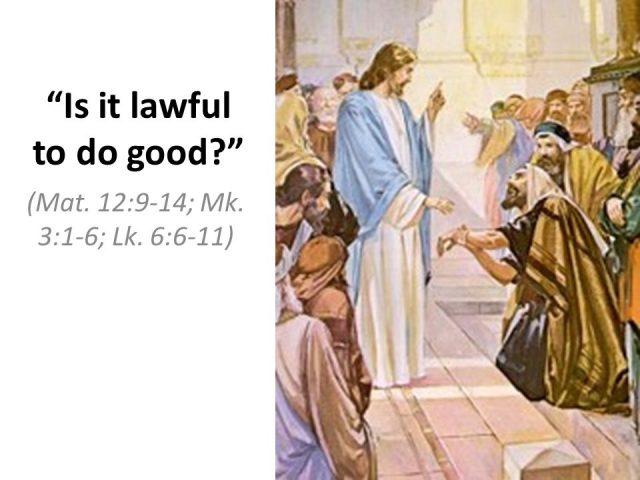Saint of the Day for January 17: St. Anthony of Egypt (251 – 356)
January 17, 2018Practically Perfect in Every Way – Three More2Life Hacks for Overcoming Perfectionism
January 17, 2018
“Is it lawful… to save life or to kill?”
Author Don Schwager – Scripture: Mark 3:1-6
1 Again he entered the synagogue, and a man was there who had a withered hand. 2 And they watched him, to see whether he would heal him on the Sabbath, so that they might accuse him. 3 And he said to the man who had the withered hand, “Come here.” 4 And he said to them, “Is it lawful on the Sabbath to do good or to do harm, to save life or to kill?” But they were silent. 5 And he looked around at them with anger, grieved at their hardness of heart, and said to the man, “Stretch out your hand.” He stretched it out, and his hand was restored. 6 The Pharisees went out, and immediately held counsel with the Herodians against him, how to destroy him.
Meditation: What is God’s intention for the commandment, keep holy the Sabbath (Exodus 20:8; Deuteronomy 5:12)? The scribes and Pharisees wanted to catch Jesus in the act of breaking the Sabbath ritual so they might accuse him of breaking God’s law. In a few penetrating words Mark the Evangelist tells us that Jesus looked at them with anger, and grieved at their hardness of hearts (Mark 3:5).
God’s purpose and intention for the Sabbath commandment
The legal scholars and religious-minded Jews were filled with fury and contempt for Jesus because they put their own thoughts of right and wrong above God. They were ensnared in their own legalism because they did not understand or see the purpose of God for the Sabbath commandment (remember the Sabbath day – to keep it holy – Exodus 20:8).. Jesus shows their fallacy by pointing to God’s intention for the Sabbath: to do good and to save life rather than to do evil or to destroy life (Mark 3:3).
Commemorating Christ’s resurrection and work of redemption on the Lord’s Day
Since the time of the first Apostles, Christians have traditionally celebrated Sunday as the Lord’s Day (Revelation 1:10; Acts 20:7; Luke 24:30; 1 Corinthians 16:1-2) to worship together around the table of the Lord (the Eucharist or Lord’s Supper) and to commemorate God’s work of redemption in Jesus Christ and the new work of creation accomplished through Christ’s death and resurrection.
Taking “our sabbath rest” is a way of expressing honor to God for all that he has done for us in and through Jesus Christ our Lord and Redeemer. Such “rest” however does not exempt us from our love for our neighbor. If we truly love the Lord above all else, then the love of God will overflow to love of neighbor as well. Do you honor the Lord in the way you celebrate Sunday, the Lord’s Day and in the way you treat you neighbor?
“Lord Jesus, in your victory over sin and death on the cross and in your resurrection you give us the assurance of sharing in the eternal rest of heaven. Transform my heart with your love that I may freely serve my neighbor for his good and find joy and refreshment in the celebration of Sunday as the Lord’s Day.”
Psalm 110:1-4 1 The LORD says to my lord: “Sit at my right hand, till I make your enemies your footstool.”
2 The LORD sends forth from Zion your mighty scepter. Rule in the midst of your foes!
3 Your people will offer themselves freely on the day you lead your host upon the holy mountains. From the womb of the morning like dew your youth will come to you.
4 The LORD has sworn and will not change his mind, “You are a priest for ever after the order of Melchizedek.”
Daily Quote from the early church fathers: The tender compassion of the Lord, by John Chrysostom, 547-407 A.D.
“Jesus said to the man with the withered hand, ‘Come here.’ Then he challenged the Pharisees as to whether it would be lawful to do good on the sabbath. Note the tender compassion of the Lord when he deliberately brought the man with the withered hand right into their presence (Luke 6:8). He hoped that the mere sight of the misfortune might soften them, that they might become a little less spiteful by seeing the affliction, and perhaps out of sorrow mend their own ways. But they remained callous and unfeeling. They preferred to do harm to the name of Christ than to see this poor man made whole. They betrayed their wickedness not only by their hostility to Christ, but also by their doing so with such contentiousness that they treated with disdain his mercies to others.” (excerpt from THE GOSPEL OF MATTHEW, HOMILY 40.1)
Meditations may be freely reprinted for non-commercial use – please cite: copyright (c) 2018 Servants of the Word, source: www.dailyscripture.net, author Don Schwager
Scripture quotations from Common Bible: Revised Standard Version of the Bible, copyright 1973, and Ignatius Edition of the Revised Standard Version of the Bible, copyright 2006, by the Division of Christian Education of the National Council of the Churches of Christ in the United States of America. Used by permission. All rights reserved. Citation references for quotes from the writings of the early church fathers can be found here.




